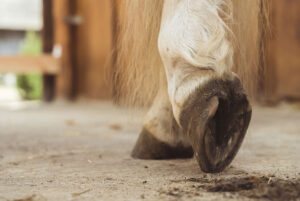Equine Pythiosis: Unsightly, Deadly, and Spreading
- Topics: Article, Other Skin Problems
If your horse doesn’t live in a tropical or subtropical region, you’ve most likely never had to worry about equine pythiosis, a relatively rare and sometimes fatal skin infection that causes tumorlike masses and ulcerated lesions in horses. But researchers have noted recently that the disease is now also affecting horses in cooler, drier climates–indicating that it’s becoming more widespread and is an affliction more horse owners need to be aware of.
According to Leonel Mendoza, MSc, PhD, an associate professor in the Department of Microbiology at Michigan State University, who recently completed a review on the disease, equine pythiosis is a rare infection caused by a funguslike microorganism called Pythium insidiosum. The infection, typically found in tropical and subtropical climates, has recently been diagnosed farther north than usual, appearing in drier states such as Arizona, California, and Washington state. The reason for the geographic spread of the disease remains unknown.
The causative agent resides in standing water or moist soil and finds its way into small wounds on a horse’s legs, lower abdomen, chest, or face, causing large, tumorlike masses that ulcerate. These itchy lesions contain necrotic (dead) tissue with a characteristic strong odor and draining tracts, and they contain stony masses called "kunkers" at their core.
Once considered a rare infection in the United States, pythiosis is a noncontagious disease with hundreds of cases reported annually in dogs and horses, and few cases in humans (one to two per year). Mendoza notes that there have been no reports of animal-to-animal or animal-to-human (or vice versa) transmission of the disease
Create a free account with TheHorse.com to view this content.
TheHorse.com is home to thousands of free articles about horse health care. In order to access some of our exclusive free content, you must be signed into TheHorse.com.
Start your free account today!
Already have an account?
and continue reading.

Related Articles
Stay on top of the most recent Horse Health news with


















